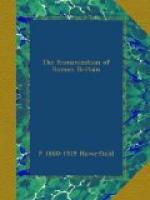No less important results followed from unofficial causes. The legionary fortresses collected settlers—traders, women, veterans—under the shelter of their ramparts, and their canabae or ‘bazaars’, to use an Anglo-Indian term, formed centres of Roman speech and life, and often developed into cities. Italians, especially of the upper-middle class, merchants and others,[1] emigrated freely and formed tiny Roman settlements, often in districts where no troops were stationed. Chances opened at Rome for able provincials who became Romanized. Above all, the definite and coherent civilization of Italy took hold of uncivilized but intelligent men, while the tolerance of Rome, which coerced no one into conformity, made its culture the more attractive because it seemed the less inevitable.
[Footnote 1: The best parallel to the Italian emigration to the provinces during the late Republic and early Empire is perhaps to be found in the mediaeval German emigrations to Galicia and parts of Hungary (the Siebenbuergen Saxons are an exception), which Professor R.F. Kaindl has so well and minutely described. The present day mass emigration of the lower classes is something quite distinct.]
The process is hard to follow in detail, since datable evidence is scanty. In general, however, the instances of really native fashions or speech which are recorded from this or that province belong to the early Empire. To that age we can assign not only the Celtic, Iberian, and Punic inscriptions which we find occasionally in Gaul, Spain, and Africa, but also the use of the native titles like Vergobret or Suffete, and the retention of native personal names and of that class of Latin nomina, like Lovessius, which are formed out of native names. In the middle Empire such things are rarer. Exceptions naturally meet us here and there. Punic was in almost official use in towns like Gigthis in the Syrtis region in the second century, and Punic-speaking clergy, it appears, were needed in some of the villages of fourth-century Africa. Celtic is stated to have been in use at the same epoch among the Treveri of eastern Gaul—presumably in the great woodlands of the Ardennes, the Eifel and the Hunsrueck.[1] Basque was obviously in use throughout the Roman period in the valleys of the Pyrenees. So in Asia Minor, where Greek was the dominant tongue, six or seven other dialects, Galatian, Phrygian, Lycaonian, and others, lived on till a very late date, especially (as it seems) on the uncivilized pastoral areas of the Imperial domain-lands.[2] Some of these are survivals, noted at the time as exceptional, and counting in the scales of history for no more than the survival of Greek in a few modern villages of southern Italy or the Wendish oasis seventy miles from Berlin. Others are more serious facts. But they do not alter the main position. In most regions of the west the Latin tongue obviously prevailed. It was, indeed, powerful enough to lead the Christian Church to insist on its use, and not, as in Syria and Egypt, to encourage native dialects.[3]




